Related Research Articles
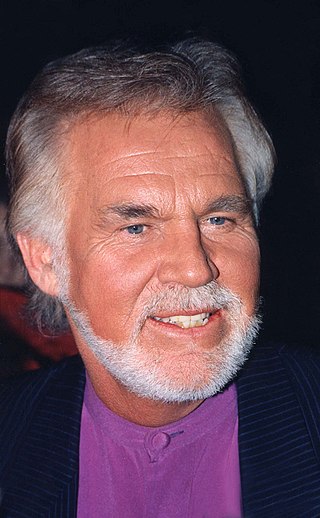
Kenny Rogers was an American singer and songwriter. He was inducted into the Country Music Hall of Fame in 2013. Rogers was particularly popular with country audiences but also charted more than 120 hit singles across various genres, topping the country and pop album charts for more than 200 individual weeks in the United States alone. He sold more than 100 million records worldwide during his lifetime, making him one of the best-selling music artists of all time. His fame and career spanned multiple genres: jazz, folk, pop, rock, and country. He remade his career and was one of the most successful cross-over artists of all time.

Dottie West was an American country singer and songwriter. She also had several credits as an actress. A distinguished figure in the country genre, West was among several people who helped to elevate the platform of female country artists. She was also known for mentoring up-and-coming artists and being the first woman to win a country music accolade from the Grammy Awards.

"Islands in the Stream" is a song written by the Bee Gees and recorded by American country music artists Kenny Rogers and Dolly Parton. It was released in August 1983 as the first single from Rogers's fifteenth studio album Eyes That See in the Dark. The Bee Gees released a live version in 1998 and a studio version in 2001.
Larry Butler was a country music producer/songwriter. From the mid-1970s through the 1980s, he worked with Kenny Rogers. Many of his albums with Rogers went either gold or platinum and accumulated many millions of sales around the world. These albums include Kenny Rogers (1976), The Gambler (1978), Gideon (1980) and I Prefer The Moonlight (1987). Rogers and Butler maintained a friendship outside of show business. Butler also produced Rogers' 1993 album If Only My Heart Had A Voice. He also participated in Rogers 2006 retrospective DVD The Journey.
"A Lesson in Leavin'", also titled as "Lesson in Leavin"', is a song written by Randy Goodrum and Brent Maher. It was originally recorded in 1979 by American country music singer, Dottie West, for her Special Delivery album.

"What Are We Doin' in Love" is a song written by Randy Goodrum and recorded by American country music artist Dottie West. Although not credited on the single release, the song also features American country and pop recording artist Kenny Rogers. It was released in March 1981 as the second single from the album Wild West. The song was West and Rogers' third and final number one on the country chart.
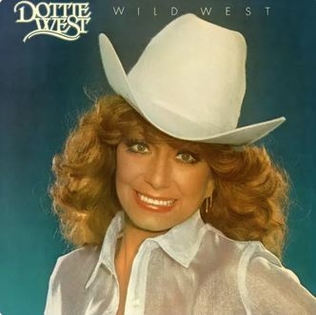
Wild West is a studio album by American country artist Dottie West. It was released by Liberty Records in February 1981. It was one of several albums that were part of West's commercial resurgence in the late 1970s and early 1980s. On the album were three singles: the chart-topping "Are You Happy?" and "What Are We Doin' in Love". The album itself was among West's highest-peaking, reaching the top five of the US country albums chart. It was met with favorable reviews from several music publications.
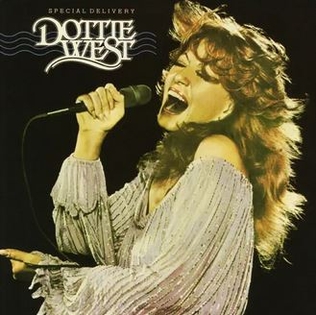
Special Delivery is a studio album by American country artist Dottie West. It was released by both Liberty Records and United Artists Records in November 1979. The album was released following a successful commercial comeback in West's career. Its new country pop production style was considered a departure from her previous recordings. The project consisted of ten tracks, six of which were composed by producers Randy Goodrum and Brent Maher. Three of the tracks were singles, including West's first solo chart-topper "A Lesson in Leavin'". Special Delivery reached the top 20 of the US country chart and was among her longest-running albums on the country survey
"It's High Time" is a song written by Randy Goodrum and Brent Maher, and recorded by American country music artist Dottie West. It was released in October 1981 as the first single from the album High Times.

Classics is a duet album by Kenny Rogers and Dottie West, released in 1979.

Every Time Two Fools Collide is a 1978 duet album by American country music singers Kenny Rogers and Dottie West.

"Last Time I Saw Him" is a 1973 song by Diana Ross, being a composition by Michael Masser and lyricist Pam Sawyer. The track was produced by Masser and released as the first single on December 6, 1973, from her album of the same name.
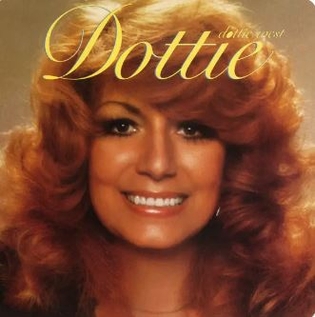
Dottie is a studio album by American country artist Dottie West. It was released in August 1978 via United Artists Records and contained ten tracks. It was the 26th studio album of West's career and her third with the United Artists label. Of its ten tracks, three were self-penned by West herself. One single was spawned from the album titled "Come See Me and Come Lonely", which reached the top 20 on the US country chart. Dottie also made the US country albums chart following its original release and was given a positive review by Record World magazine.
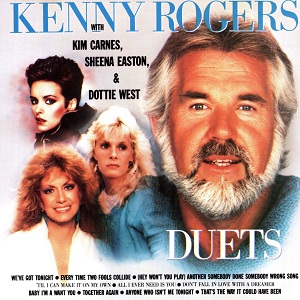
Duets is a compilation album by Kenny Rogers released in 1984 by Liberty Records, issued after Rogers left the label and signed to RCA Records.
"Rings of Gold" is a song recorded by American country music artists Dottie West and Don Gibson. It was released in February 1969 as the first single from their album Dottie and Don. The song peaked at number 2 on the Billboard Hot Country Singles chart. It also reached number 1 on the RPM Country Tracks chart in Canada.

The singles discography of American country artist Dottie West contains 59 singles released as a solo artist, 12 singles released as a collaborative artist, 3 promotional singles and 1 other charting song. West signed with RCA Victor Records in 1963, having her first Top 40 hit the same year. It was followed in 1964 by "Love Is No Excuse", a duet with Jim Reeves that became West's first top 10 hit. In 1964, she also released "Here Comes My Baby". The song reached number 10 on the Billboard Hot Country Singles chart and became the first song by a female country artist to win a Grammy award. From her 1966 album, West issued four singles, including the top 10 hits "Would You Hold It Against Me" and "What's Come Over My Baby". Over the next two years she had major hits with "Paper Mansions", "Like a Fool", "Country Girl", and "Reno". In 1969, West collaborated with Don Gibson on "Rings of Gold", which reached number 2 on the Billboard country chart. In 1973, she released a single version of a commercial jingle originally used by The Coca-Cola Company. Entitled "Country Sunshine", the song became West's biggest hit, reaching number 2 on the country songs chart and number 49 on the Billboard Hot 100. The song also nominated her for her eleventh Grammy. After releasing the top 10 hit "Last Time I Saw Him" (1974), West's chart hits declined and she was dropped from RCA in 1976.
"Anyone Who Isn't Me Tonight" is a song written by Julie Didier and Casey Kelly, and recorded by American country music artists Kenny Rogers and Dottie West. It was released in August 1978 as the second single from the album Every Time Two Fools Collide. The song peaked at number 2 on the Billboard Hot Country Singles chart. The song also peaked at number 10 on the RPM Country Tracks chart that year.

The albums discography of American country artist Dottie West contains 28 studio albums as a solo artist, five studio albums as a collaborative artist, 18 compilation albums and additional album appearance. Among West's studio releases were five collaborative albums with various artists, including Kenny Rogers. After signing with RCA Victor Records in 1963, West released her debut studio album Here Comes My Baby (1965). The album peaked at number 12 on the Billboard Top Country Albums chart in July 1965. West's third studio album Suffer Time (1966) spawned four singles, including "Would You Hold It Against Me", a top 5 hit on the Billboard Hot Country Songs chart. Suffer Time would reach number 3 on the country albums chart, West's highest-charting solo album. Between 1967 and 1968, West released 5 more studio albums. With All My Heart and Soul (1967) featured the top 10 hit "Paper Mansions" and the album itself peaked at number 8 on the Top Country Albums list. In 1969, she paired with Don Gibson for her first collaborative project Dottie and Don. The album featured the pair's number 2 Billboard country hit "Rings of Gold". In 1970, she collaborated with Jimmy Dean on the studio release Country Boy and Country Girl. In 1973, West had her biggest hit with the single "Country Sunshine". Its corresponding album of the same name peaked at number 17 on the country album chart in February 1974.

Billie Jo is a studio album by American country artist, Billie Jo Spears. It was released in October 1975 via United Artists Records and contained ten tracks. A mixture of new recordings and cover tunes were featured on the disc. Among them were the singles, "Stay Away from the Apple Tree" and "Silver Wings and Golden Rings". Both singles reached the top 20 of the North American country charts in 1975. The album itself reached the top 50 of the American country albums chart. It was the eighth studio album of Spears's career and her second with the United Artists label.
References
- ↑ Whitburn, Joel (2004). The Billboard Book Of Top 40 Country Hits: 1944-2006, Second edition. Record Research. p. 379.
- ↑ "Kenny Rogers Chart History (Hot Country Songs)". Billboard.
- ↑ "Kenny Rogers Chart History (Hot 100)". Billboard.
- ↑ "Kenny Rogers Chart History (Adult Contemporary)". Billboard.